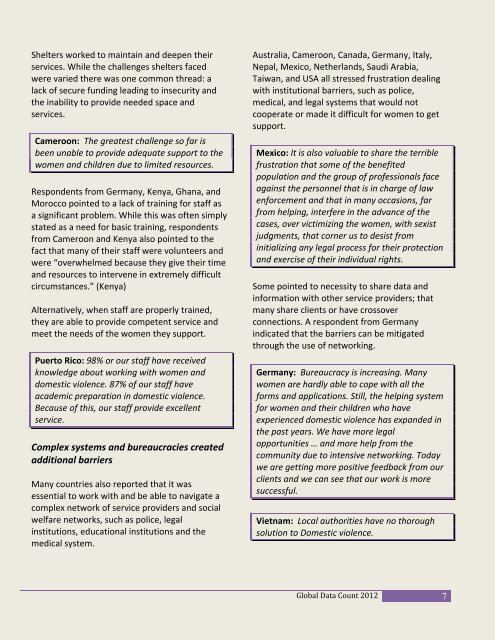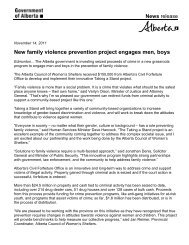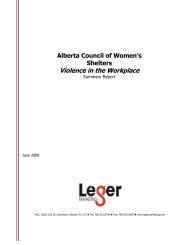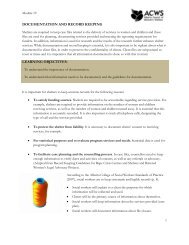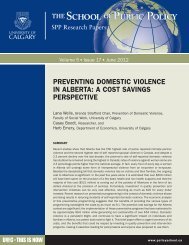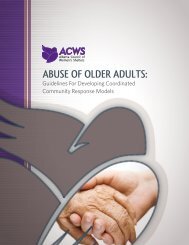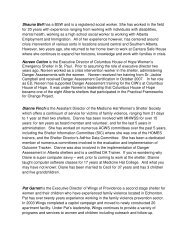Global Data Count Results - Alberta Council of Women's Shelters
Global Data Count Results - Alberta Council of Women's Shelters
Global Data Count Results - Alberta Council of Women's Shelters
- No tags were found...
Create successful ePaper yourself
Turn your PDF publications into a flip-book with our unique Google optimized e-Paper software.
<strong>Shelters</strong> worked to maintain and deepen theirservices. While the challenges shelters facedwere varied there was one common thread: alack <strong>of</strong> secure funding leading to insecurity andthe inability to provide needed space andservices.Cameroon: The greatest challenge so far isbeen unable to provide adequate support to thewomen and children due to limited resources.Respondents from Germany, Kenya, Ghana, andMorocco pointed to a lack <strong>of</strong> training for staff asa significant problem. While this was <strong>of</strong>ten simplystated as a need for basic training, respondentsfrom Cameroon and Kenya also pointed to thefact that many <strong>of</strong> their staff were volunteers andwere “overwhelmed because they give their timeand resources to intervene in extremely difficultcircumstances.” (Kenya)Alternatively, when staff are properly trained,they are able to provide competent service andmeet the needs <strong>of</strong> the women they support.Puerto Rico: 98% or our staff have receivedknowledge about working with women anddomestic violence. 87% <strong>of</strong> our staff haveacademic preparation in domestic violence.Because <strong>of</strong> this, our staff provide excellentservice.Complex systems and bureaucracies createdadditional barriersMany countries also reported that it wasessential to work with and be able to navigate acomplex network <strong>of</strong> service providers and socialwelfare networks, such as police, legalinstitutions, educational institutions and themedical system.Australia, Cameroon, Canada, Germany, Italy,Nepal, Mexico, Netherlands, Saudi Arabia,Taiwan, and USA all stressed frustration dealingwith institutional barriers, such as police,medical, and legal systems that would notcooperate or made it difficult for women to getsupport.Mexico: It is also valuable to share the terriblefrustration that some <strong>of</strong> the benefitedpopulation and the group <strong>of</strong> pr<strong>of</strong>essionals faceagainst the personnel that is in charge <strong>of</strong> lawenforcement and that in many occasions, farfrom helping, interfere in the advance <strong>of</strong> thecases, over victimizing the women, with sexistjudgments, that corner us to desist frominitializing any legal process for their protectionand exercise <strong>of</strong> their individual rights.Some pointed to necessity to share data andinformation with other service providers; thatmany share clients or have crossoverconnections. A respondent from Germanyindicated that the barriers can be mitigatedthrough the use <strong>of</strong> networking.Germany: Bureaucracy is increasing. Manywomen are hardly able to cope with all theforms and applications. Still, the helping systemfor women and their children who haveexperienced domestic violence has expanded inthe past years. We have more legalopportunities … and more help from thecommunity due to intensive networking. Todaywe are getting more positive feedback from ourclients and we can see that our work is moresuccessful.Vietnam: Local authorities have no thoroughsolution to Domestic violence.<strong>Global</strong> <strong>Data</strong> <strong>Count</strong> 2012 7


